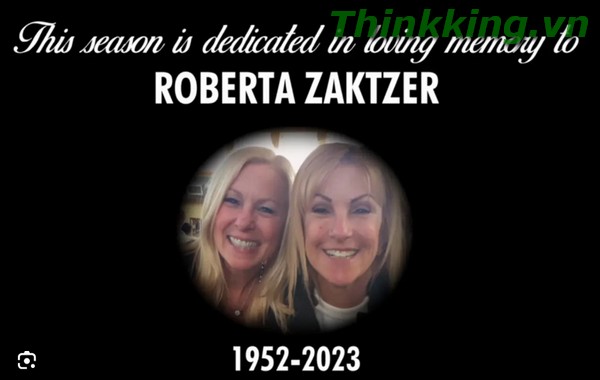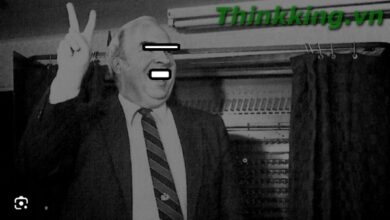The Golden Bachelor Roberta Zaktzer
Welcome to Thinkking.vn, where we delve into the fascinating world of “The Golden Bachelor Roberta Zaktzer.” In this captivating exploration, we uncover the intriguing aspects of Roberta Zaktzer’s role in the show, providing you with unique insights and perspectives. Join us as we unravel the story behind this enigmatic character and her significant contributions to “The Golden Bachelor.” This context not only sets the stage for her involvement but also sheds light on the broader themes and dynamics at play in the show.

I. Who is Roberta Zaktzer?
Specification |
Details |
| Name | Roberta Zaktzer |
| Gender | Female |
| Profession | Unknown |
| Born Year | 1952 |
| Death Day | September 10, 2023 |
| Age at Death | 70 or 71 years |
| Known as | Best Friend of Ellen Goltzer |
| Marital Status | Unknown |
| Children | Unknown |
Roberta Zaktzer was a remarkable woman who got fame due to her best friend Ellen Goltzer on Golden Bachelor. Roberta’s relationship with Ellen was particularly significant, marked by a pivotal moment when she played a pivotal role in encouraging Ellen to embark on a daring journey.
Roberta’s unwavering support and belief in Ellen led her to take a courageous leap of faith by participating in the reality dating show “Golden Bachelor.” Roberta Zaktzer’s legacy as a friend and mentor exemplified the profound impact one can have on others through genuine friendship and unwavering support, far surpassing any external accolades or recognition.
Her presence left an indelible mark on those fortunate enough to have crossed her path. Her impact transcended the bounds of fame and recognition, as she was known and cherished primarily for her role as a dear friend, a trusted confidante, and a wellspring of inspiration for many. Among the many people whose lives she touched, her friendship with Ellen Goltzer stood out as a shining example of the profound connections she forged.
Background Information about Roberta Zaktzer:The Golden Bachelor Roberta Zaktzer
Roberta Zaktzer was born in 1952.
She was best known for her close and enduring friendship with Ellen Goltzer.
Details about her profession, family, and personal life have not been publicly disclosed in the available information.
Roberta was an avid fan of “The Bachelor” and “The Bachelorette” franchise, which she enjoyed watching with her friend Ellen.
Connection to “The Golden Bachelor”:The Golden Bachelor Roberta Zaktzer
Roberta Zaktzer’s connection to “The Golden Bachelor” stems from her friendship with Ellen Goltzer, one of the contestants on the show.
Ellen Goltzer, a retired school teacher with years of teaching experience in New York, decided to participate in “The Golden Bachelor” after her retirement. Ellen’s close bond with Roberta was instrumental in motivating her to take part in the reality dating show.
Roberta’s support for Ellen extended beyond their friendship. She continued to encourage Ellen even when she was battling breast cancer at the time of Ellen’s decision to join the show.
Ellen’s participation in “The Golden Bachelor” was not only a quest for love but also a tribute to her friendship with Roberta, who shared a love for “The Bachelor” franchise.
Influence on a Friend’s Participation in the Show:
Roberta Zaktzer’s influence on Ellen Goltzer’s decision to participate in “The Golden Bachelor” was significant. Despite her health struggles, Roberta encouraged Ellen to apply for the show.
Ellen’s journey on the show was fueled by her hope to find love with Gerry Turner and enjoy her golden years in the company of a special partner. Roberta’s support and encouragement were instrumental in motivating Ellen to embark on this new chapter in her life.
Throughout the show, Roberta’s battle with cancer and her influence on Ellen’s decision served as a poignant backdrop, making Ellen’s participation even more meaningful.
The dedication of the season to Roberta’s memory and the recognition of her impact on Ellen’s life highlighted the profound bond they shared and the influence Roberta had on Ellen’s decision to participate in “The Golden Bachelor.”
The Viral Video and the Question of DID The Golden Bachelor Roberta Zaktzer
Roberta Zaktzer’s story took an unexpected turn when a viral video raised questions about her health and well-being, specifically regarding Dissociative Identity Disorder (DID). The video sparked a broader conversation about mental health awareness and the importance of understanding and supporting individuals facing such challenges.
The question of whether Roberta Zaktzer suffered from DID highlighted the need for increased awareness and empathy toward mental health conditions. It served as a reminder that appearances can be deceiving, and individuals may be dealing with internal struggles that are not immediately visible. The viral video encouraged open discussions about mental health and sought to destigmatize conditions like DID.
Purpose of the Outline: Exploring DID, the Viral Video Impact, and Treatment Options
The purpose of this outline is to delve deeper into the connection between Dissociative Identity Disorder (DID) and mental health, the impact of the viral video on public perception, and the available treatment options for individuals facing DID. By addressing these critical aspects, we aim to foster a greater understanding of mental health challenges and contribute to ongoing conversations about support, empathy, and awareness for those affected by DID.
II. The Relationship Between Dissociative Identity Disorder (DID) and Health

Dissociative Identity Disorder (DID) is a complex mental health condition that warrants a closer look at its effects on an individual’s overall well-being. Understanding the relationship between DID and health is essential for providing proper care and support to those affected.
Explanation of Dissociative Identity Disorder (DID): DID, formerly known as Multiple Personality Disorder, is a dissociative disorder characterized by the presence of two or more distinct identity states or personality states. These states can control a person’s behavior, consciousness, and memory, leading to gaps in memory and awareness. DID often results from severe psychological trauma during childhood, as a coping mechanism to deal with overwhelming stress or abuse.
Discussion of Health Challenges Faced by Individuals with DID: Individuals living with DID face a multitude of health challenges, both physical and mental. These challenges include:
- Identity Fragmentation: DID involves the fragmentation of one’s identity into distinct personality states. This fragmentation can lead to internal conflicts and confusion, affecting one’s sense of self and daily functioning.
- Memory Gaps: Amnesia between personality states can lead to memory gaps, making it challenging to recall important life events, daily activities, or even traumatic experiences.
- Chronic Stress: The constant switching between identity states can create chronic stress and emotional turmoil, impacting an individual’s overall mental health.
- Depersonalization and Derealization: Individuals with DID may experience feelings of depersonalization (feeling detached from oneself) and derealization (feeling that the world is unreal). These experiences can be distressing and disorienting.
- Self-Harming Behaviors: Some individuals with DID may engage in self-harming behaviors as a way to cope with distressing emotions or to regain a sense of control.
Mention Comorbid Mental Health Conditions, Chronic Stress, and Self-Harming Behaviors: DID is often accompanied by comorbid mental health conditions, such as depression, anxiety disorders, post-traumatic stress disorder (PTSD), and substance abuse. The chronic stress associated with DID can exacerbate these conditions, making treatment more complex.
Additionally, some individuals with DID resort to self-harming behaviors as a way to cope with their emotional pain. These behaviors can include cutting, burning, or other forms of self-injury.
Importance of a Holistic Approach to Healthcare for Individuals with DID: Treating DID requires a holistic approach that addresses both the psychological and physical aspects of health. This approach may include:
- Psychotherapy: DID is often treated with psychotherapy, particularly approaches like Dialectical Behavior Therapy (DBT) and Eye Movement Desensitization and Reprocessing (EMDR). These therapies aim to integrate identity states and process traumatic memories.
- Medication: Medication may be prescribed to manage comorbid conditions such as depression and anxiety.
- Supportive Care: Providing a safe and supportive environment is crucial for individuals with DID. Support from mental health professionals, friends, and family can make a significant difference in their recovery.
- Self-Care: Encouraging individuals with DID to engage in self-care practices, such as mindfulness, stress reduction techniques, and healthy coping strategies, is essential for improving their overall health.
In conclusion, understanding the relationship between Dissociative Identity Disorder (DID) and health is vital for developing effective treatment strategies and providing support to those affected by this complex condition. A holistic approach that considers both the psychological and physical well-being of individuals with DID is essential for their recovery and well-being.
III. How Roberta Zaktzer’s Video on Dissociative Identity Disorder Went Viral
Roberta Zaktzer’s video addressing Dissociative Identity Disorder (DID) gained immense popularity, going viral on various social media platforms. The viral nature of the video can be attributed to several key factors:
Description of Why Roberta Zaktzer’s Video on DID Went Viral: Roberta Zaktzer’s video struck a chord with viewers due to its compelling content and relatability. In her video, she shared her personal journey of living with DID, offering insights into the challenges, triumphs, and experiences associated with the disorder. Her authenticity and openness resonated with a broad audience, including those directly affected by DID and those seeking to understand it better.
Highlighting the Storytelling Approach and Its Impact: One of the video’s standout features was Roberta’s storytelling approach. Rather than presenting clinical information, she shared her story in a relatable and empathetic manner. This storytelling approach allowed viewers to connect with her on a human level, fostering empathy and understanding for individuals living with DID. Roberta’s courage in sharing her experiences helped reduce the stigma surrounding mental health conditions.
Role of Social Media in the Video’s Accessibility: Social media played a pivotal role in the video’s accessibility and widespread reach. Platforms like YouTube, Instagram, and TikTok provided the perfect medium for Roberta’s video to gain traction. Social media allowed her message to reach a global audience quickly and efficiently, breaking down geographical barriers. Viewers could easily share the video with friends and family, contributing to its virality.
Timing and the Context of Growing Mental Health Awareness: Roberta Zaktzer’s video coincided with a broader societal shift towards increased awareness and acceptance of mental health issues. The timing was crucial, as conversations around mental health were gaining momentum in various communities. Roberta’s video became part of this larger dialogue, contributing to the normalization of discussing mental health conditions openly.
IV. Can Dissociative Identity Disorder Lead to Death?The Golden Bachelor Roberta Zaktzer
Dissociative Identity Disorder (DID) is a complex and often misunderstood condition that affects an individual’s mental and emotional well-being. It is essential to clarify that DID itself does not directly lead to death. However, individuals with DID may face specific challenges that can increase their vulnerability, particularly in terms of mental health.
1. Clarification: DID Itself Does Not Directly Lead to Death It is crucial to dispel any misconceptions that suggest DID is inherently life-threatening. DID is a dissociative disorder characterized by the presence of two or more distinct personality states, often accompanied by memory gaps. While living with DID can be challenging, it is not a condition that directly leads to death. Individuals with DID can lead fulfilling lives with the appropriate treatment and support.
2. Elevated Risk of Self-Harm and Suicide While DID itself does not pose a direct threat to one’s life, individuals with DID may be at an increased risk of self-harm and suicide. This risk is primarily due to the emotional distress, trauma history, and co-occurring mental health conditions commonly associated with DID. The presence of multiple personality states can also contribute to a sense of internal turmoil and inner conflict.
It is essential to recognize the signs of self-harming behaviors or suicidal ideation among individuals with DID. Friends, family members, and healthcare professionals should remain vigilant and provide emotional support. Timely intervention and appropriate mental health care are critical in addressing these risks.
3. Emphasis on Proper Treatment and Support Proper treatment and support are essential for individuals living with DID. The journey toward recovery often involves therapy, particularly specialized treatments like Dialectical Behavior Therapy (DBT), Eye Movement Desensitization and Reprocessing (EMDR), and cognitive-behavioral approaches. These therapeutic modalities can help individuals manage their symptoms, build coping strategies, and improve their overall well-being.
Support from loved ones and a strong social network can also play a crucial role in an individual’s recovery. Open and nonjudgmental communication can help reduce feelings of isolation and provide a sense of belonging.
V. Treatment Options for Individuals with Dissociative Identity Disorder The Golden Bachelor Roberta Zaktzer
Dissociative Identity Disorder (DID) is a complex condition that requires specialized care and treatment. The goal of treatment for individuals with DID is to improve their overall well-being, enhance their quality of life, and help them manage the challenges associated with the disorder. Here, we will explore various treatment options available for individuals with DID, emphasizing a holistic and multidisciplinary approach.
1. Overview of Treatment Options for DID
- Psychotherapy: Psychotherapy, particularly specialized therapies such as Dialectical Behavior Therapy (DBT), Eye Movement Desensitization and Reprocessing (EMDR), and cognitive-behavioral approaches, is the cornerstone of DID treatment. Therapy aims to help individuals understand and integrate their distinct personality states, manage symptoms, and address past traumas.
- Medication Management: While there are no specific medications that can treat DID itself, some individuals may benefit from medication to manage associated symptoms such as depression, anxiety, or mood disturbances. Medication should be prescribed and monitored by a qualified healthcare provider.
- Supportive Care: A strong support system is vital for individuals with DID. Family, friends, and loved ones can provide emotional support, encouragement, and understanding throughout the recovery process.
2. Role of Psychotherapy in Integrating Identities and Addressing Past Trauma
- Psychotherapy is the primary treatment modality for DID. Therapists work with individuals to help them integrate their distinct personality states, allowing for greater self-awareness and control.
- Addressing Past Trauma: Many individuals with DID have experienced significant trauma in their lives, often in childhood. Therapy helps them process and heal from these traumatic experiences, reducing their impact on daily life.
- Coping Strategies: Therapists teach coping strategies to manage symptoms such as dissociation, memory gaps, and mood fluctuations. These strategies empower individuals to regain control over their lives.
3. Medication Management for Symptom Control
- While medications do not treat DID itself, they can be helpful in managing associated symptoms. Antidepressants, anti-anxiety medications, and mood stabilizers may be prescribed when necessary.
- Medication management should always be supervised by a qualified psychiatrist or healthcare provider, as it is essential to monitor potential side effects and interactions.
4. Importance of a Multidisciplinary Team in Providing Comprehensive Care
- Individuals with DID benefit from a multidisciplinary approach to care. A treatment team may include therapists, psychiatrists, social workers, and other healthcare professionals.
- Coordinated Care: Collaboration among team members ensures that treatment is comprehensive and tailored to the individual’s unique needs.
- Holistic Approach: A holistic approach addresses not only the symptoms of DID but also the individual’s overall mental, emotional, and physical well-being.
VI. Conclusion “The Golden Bachelor Roberta Zaktzer “
In conclusion, it’s crucial to clarify that there is no evidence linking Roberta Zaktzer’s death to Dissociative Identity Disorder (DID). While she openly discussed her experiences with DID in a viral video, it’s essential to avoid making unfounded assumptions about the cause of her passing.
Understanding the complexities of mental health conditions, such as DID, requires verified information and medical expertise. Jumping to conclusions can perpetuate misconceptions and stigmatize individuals who are already dealing with significant challenges.
As we reflect on the legacy of Roberta Zaktzer, let’s remember the importance of compassion, empathy, and respect when discussing mental health matters. It’s an opportunity to raise awareness, provide accurate information, and support those who may be struggling with similar conditions.
Ultimately, Roberta Zaktzer’s journey and her willingness to share her story shed light on the importance of mental health awareness and the need for a more understanding and inclusive society.
| Please note that all information presented in this article has been obtained from a variety of sources, including wikipedia.org and several other newspapers. Although we have tried our best to verify all information, we cannot guarantee that everything mentioned is accurate and 100% verified. Therefore, we recommend caution when referencing this article or using it as a source in your own research or report. |










